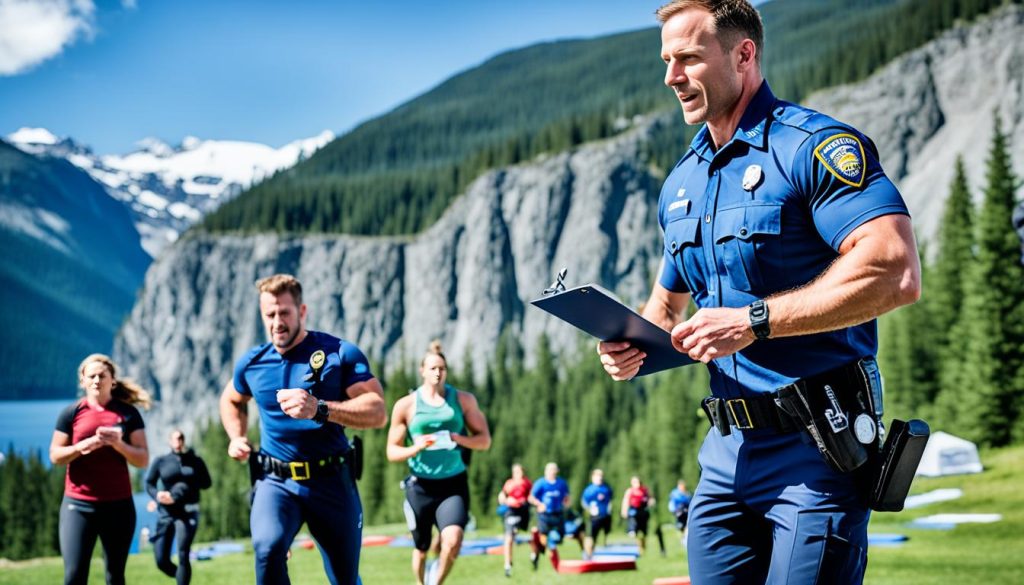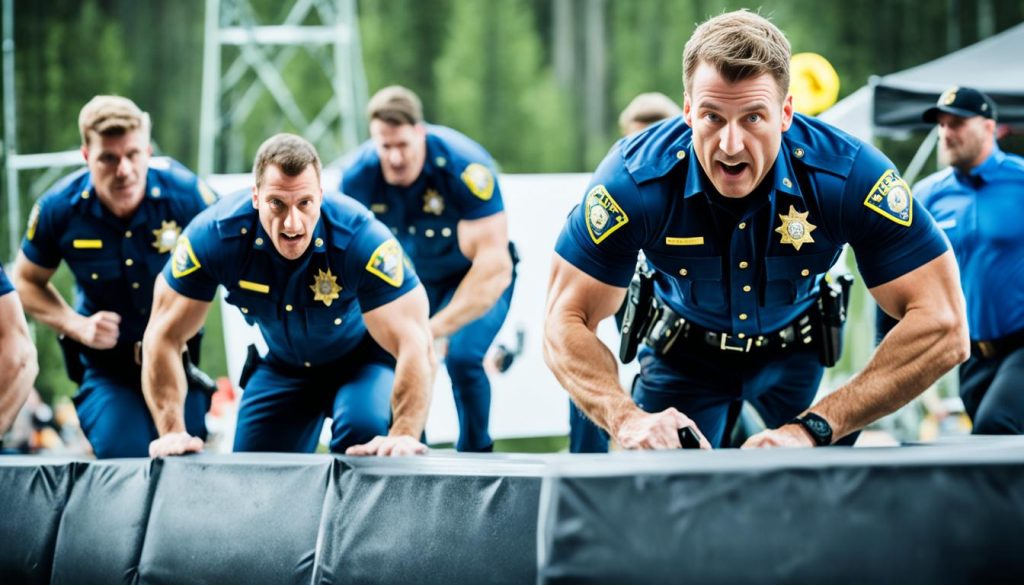Are you considering a career with the Royal Canadian Mounted Police (RCMP)? Before applying, it’s essential to understand the physical requirements and fitness standards expected of RCMP applicants. The RCMP utilizes the Physical Ability Requirement Evaluation (PARE) as a screening test to assess an applicant’s physical readiness for the rigorous training and demands of RCMP service.
The PARE evaluates several aspects of physical fitness, including aerobic and anaerobic power, agility, muscular strength and endurance, and body composition. By measuring these factors, the test determines an applicant’s suitability for RCMP training and service. Performance on the PARE test can classify individuals as successful or unsuccessful performers, with different variables showing the highest correlation for males and females.
Key Takeaways
- The RCMP has specific physical requirements for applicants, assessed through the PARE test.
- The PARE evaluates aerobic and anaerobic power, agility, strength, endurance, and body composition.
- Performance on the PARE test determines an applicant’s suitability for RCMP training and service.
- There are gender-specific variables that show the highest correlation with PARE performance.
- Physical fitness is crucial for RCMP officers due to the demanding nature of their job.
PARE Test Analysis and Results
A study conducted on the PARE test revealed valuable insights into the relationship between specific physical fitness tests and performance on the Royal Canadian Mounted Police (RCMP) Physical Ability Requirement Evaluation (PARE). These findings shed light on the importance of targeted physical abilities for successful completion of the test.
For males, the study identified a three-variable model that explained 79% of the variability in PARE time. The variables included bench press, standing long jump, and agility. This indicates that an applicant’s upper body strength, lower body power, and agility significantly impact their performance on the PARE test.
On the other hand, females showed a different pattern of physical abilities that correlated with PARE performance. Agility was identified as the most significant variable, explaining 43% of the variability in PARE time for female applicants.
Furthermore, logistic regression analysis of the females’ data resulted in a two-variable model comprising agility and a 1.5-mile endurance run. This model achieved an impressive 93% overall classification accuracy, highlighting the importance of agility and cardiovascular endurance for successful performance on the PARE test for female applicants.
These findings underscore the significance of specific physical abilities, such as upper body strength, lower body power, agility, and cardiovascular endurance, in preparing for and excelling in the RCMP PARE test. By prioritizing these abilities in training and conditioning programs, applicants can enhance their chances of successfully meeting the physical requirements of the RCMP.

| Physical Fitness Tests | Variability Explained |
|---|---|
| Bench Press, Standing Long Jump, and Agility (Males) | 79% |
| Agility (Females) | 43% |
| Agility and 1.5-Mile Endurance Run (Females, Logistic Regression Model) | 93% (Overall Classification Accuracy) |
Physical Activity of Police Officers
A study published in the Journal of Occupational and Environmental Medicine examined the physical activity levels of police officers. The study found that police officers engage in low levels of physical activity during their work hours. On average, their activity intensity is comparable to activities such as washing dishes or holding a baby. However, officers tend to be more active on their off-duty days. This suggests that police work is primarily a sedentary occupation, with bursts of high-intensity activity during critical incidents. The study also highlighted the higher risk of cardiovascular disease among police officers and the importance of physical activity in mitigating this risk.
Physical fitness plays a crucial role in the demands of law enforcement professions, including the Royal Canadian Mounted Police (RCMP). The RCMP requires its officers to undergo a rigorous physical fitness test, known as the RCMP Physical Abilities Requirement Evaluation (PARE), to ensure they possess the necessary physical capabilities to perform their duties effectively.

Engaging in regular physical activity, both on and off duty, is essential for maintaining the physical fitness levels required for RCMP officers. By participating in regular exercise, officers can improve their aerobic and anaerobic power, agility, muscular strength and endurance, and body composition. These fitness components are crucial for successfully meeting the physical training requirements of the RCMP.
Furthermore, physical activity has numerous health benefits for police officers, including mitigating the risk of cardiovascular disease. Along with the demanding and often unpredictable nature of law enforcement work, physical fitness plays a vital role in ensuring the well-being and safety of RCMP officers, their colleagues, and the public they serve.
Physical fitness not only enhances an officer’s ability to respond effectively in critical situations but also promotes overall health and well-being, reducing the risk of injuries and improving quality of life. By prioritizing physical activity and meeting the RCMP’s physical training requirements, officers can excel in their duties while maintaining optimal health and fitness levels.
The Importance of Physical Fitness for RCMP Officers
Physical fitness plays a crucial role in the lives of RCMP officers, given the demanding nature of their job. The RCMP physical requirements encompass a range of tasks, including chasing and physically controlling suspects, as well as carrying heavy weights. Ensuring that officers meet these physical requirements is essential for them to effectively perform their duties and safeguard their own well-being, as well as that of their colleagues and the public they serve.
The RCMP physical fitness test used to assess applicants’ physical readiness is the Physical Ability Requirement Evaluation (PARE). This comprehensive test gauges an individual’s ability to perform the tasks required in the line of duty. By evaluating aerobic and anaerobic power, agility, muscular strength and endurance, and body composition, the PARE provides a comprehensive assessment of an applicant’s physical capabilities.
It’s not uncommon for RCMP officers to self-report higher levels of physical activity compared to the general population. However, despite these self-reported activity levels, rates of overweight and obesity within the profession remain high. This underscores the importance of ongoing physical fitness training and maintenance. Maintaining physical fitness is not only crucial for performing day-to-day tasks but also for mitigating the risk of injury, promoting overall health, and improving job performance.
The Risks of Physical Inactivity for RCMP Officers
Physical inactivity among RCMP officers poses significant health risks. It increases the likelihood of developing cardiovascular disease and other chronic conditions. Studies have shown that higher body weight is associated with elevated mortality rates from cardiovascular disease and other causes. It is crucial for officers to address risk factors such as physical inactivity before chronic diseases manifest.
Even small changes in activity levels can have a positive impact on reducing the risk of cardiovascular disease and improving overall health outcomes. Therefore, it is essential for RCMP officers to incorporate regular physical exercise and maintain an active lifestyle to mitigate these risks. Implementing physical fitness requirements and conducting annual physical exams can help monitor and address these risks effectively.
Incorporating regular physical activity not only reduces the risk of cardiovascular disease but also improves overall well-being and mental health. Engaging in physical exercise enhances mood, reduces stress levels, improves cognitive function, and promotes better sleep patterns in officers. These benefits contribute to the overall wellness and readiness of RCMP officers for the physical demands of their duties.
Cardiovascular Disease Risks
The risk of cardiovascular disease is particularly high among RCMP officers due to the physically demanding nature of their job. Prolonged periods of inactivity combined with sudden bursts of intense physical activity can strain the cardiovascular system, increasing the likelihood of developing heart-related conditions and hypertension. Engaging in regular physical exercise can help strengthen the heart and mitigate these risks.
Mental Health and Well-being
Physical inactivity can also negatively impact mental health and well-being. Studies have shown that regular exercise is associated with a reduced risk of mental health disorders such as anxiety and depression. It improves mood, boosts self-esteem, promotes better cognitive function, and enhances overall quality of life. By incorporating physical fitness into their routine, RCMP officers can enhance their mental resilience and better cope with the challenges of their profession.
Recognizing the risks associated with physical inactivity, the RCMP should prioritize physical fitness and promote a culture of active living among their officers. By providing access to fitness facilities, offering wellness programs, and encouraging a healthy work-life balance, the RCMP can ensure the well-being, longevity, and overall performance of their officers. Putting physical fitness at the forefront will empower officers to meet the rigorous demands of their job and serve their communities effectively.
| Risks of Physical Inactivity for RCMP Officers | Benefits of Regular Physical Activity |
|---|---|
| Increased risk of cardiovascular disease | Reduces the risk of cardiovascular disease |
| Higher mortality rates from cardiovascular disease and other causes | Improves overall well-being and mental health |
| Impact on body weight and body composition | Enhances mood and reduces stress levels |
| Higher risk of chronic conditions such as hypertension | Boosts self-esteem and cognitive function |
| Greater susceptibility to mental health disorders | Promotes better sleep patterns |
Addressing the Physical Fitness Needs of RCMP Officers
To ensure the physical fitness of RCMP officers, it is imperative to establish and uphold rigorous physical fitness standards for both recruits and active officers. Regular physical fitness assessments play a pivotal role in identifying areas of improvement and ensuring that officers meet the necessary requirements to effectively perform their duties. By conducting these assessments, we can address any deficiencies and provide targeted training to enhance their physical capabilities.
In addition to assessments, it is equally important to prioritize health education and wellness programs. These initiatives raise awareness about the significance of physical activity and overall well-being among RCMP officers. By equipping officers with the knowledge and resources they need to maintain their physical fitness, we can foster a culture of health and ensure optimal performance in demanding situations.
Implementing these measures is crucial for supporting the long-term health and well-being of RCMP officers. By reducing the risk of cardiovascular disease and other health complications, we prioritize the safety and effectiveness of our officers in serving and protecting the public. Together, let’s create an environment that encourages physical fitness, upholds high standards, and empowers RCMP officers to fulfill their duties with confidence and resilience.